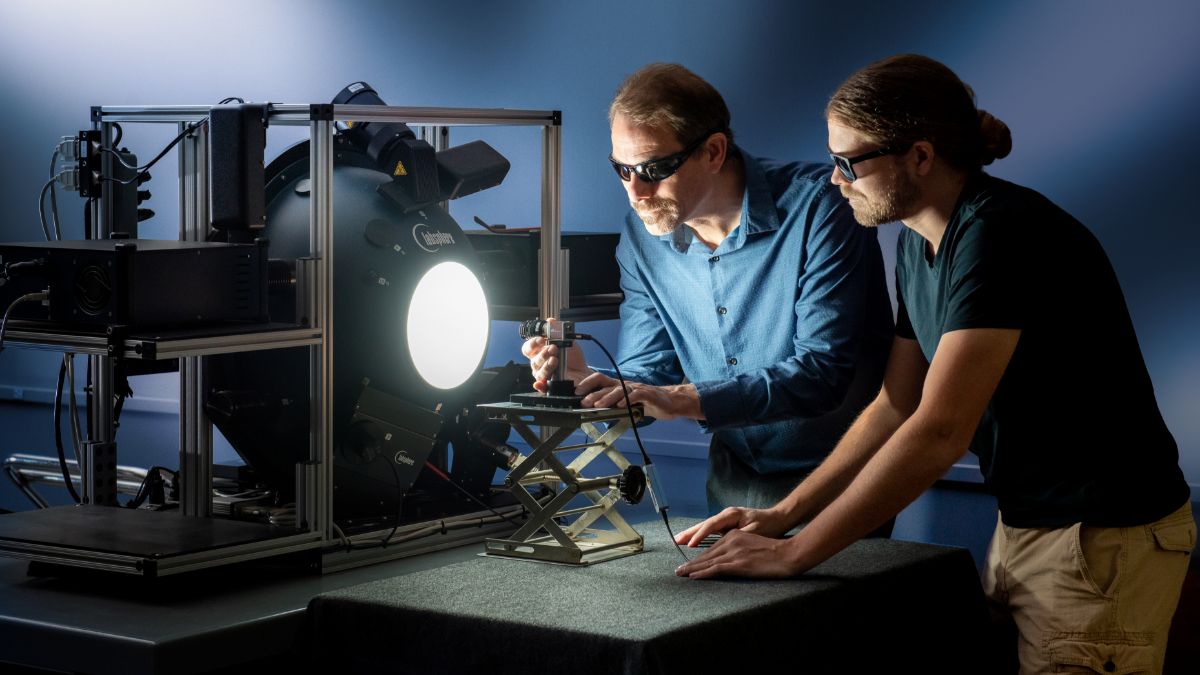Imaging Science Doctor of Philosophy (Ph.D.) Degree

Imaging Science
Doctor of Philosophy (Ph.D.) Degree
- RIT /
- Rochester Institute of Technology /
- Academics /
- Imaging Science Ph.D.
Reach the pinnacle of status of higher education in imaging science acquiring the capabilities, skills, and experience to succeed in this diverse field.
Overview for Imaging Science Ph.D.
The Ph.D. in imaging science signifies high achievement in scholarship and independent investigation in the diverse aspects of imaging science. Students contribute their fundamental body of knowledge in science and engineering that is associated with this field of study. As an imaging Ph.D. candidate, you’ll acquire the capabilities, skills, and experience to continue to expand the limits of the discipline and meet future scholarly, industrial, and government demands on the field.
Candidates for the doctoral degree must demonstrate proficiency by:
- Successfully completing course work, including a core curriculum, as defined by the student’s plan of study;
- Passing a series of examinations; and
- Completing an acceptable dissertation under the supervision of the student’s research advisor and dissertation committee.
Plan of Study
All students must complete a minimum of 60 credit hours of course work and research. The core curriculum spans and integrates a common body of knowledge essential to an understanding of imaging processes and applications. Courses are defined by the student’s study plan and must include core course sequences plus a sequence in a topical area such as remote sensing, digital image processing, color imaging, digital graphics, electro-optical imaging systems, and microlithographic imaging technologies.
Students may take a limited number of credit hours in other departments and must complete research credits including two credits of research associated with the research seminar course, Graduate Seminar.
Graduate elective courses offered by the Chester F. Carlson Center for Imaging Science (and other RIT academic departments in fields closely allied with imaging science) allow students to concentrate their studies in a range of imaging science research and imaging application areas, including electro-optical imaging, digital image processing, color science, perception and vision, electrophotography, lithography, remote sensing, medical imaging, electronic printing, and machine vision.
Advancement to Candidacy
Advancement to candidacy occurs through the following steps:
- Advisor selection
- Submission and approval of a preliminary study plan
- Passing a written qualifying exam
- Study plan revision based on the outcome of qualifying exam and adviser recommendation
- Research committee appointment
- Candidacy exam based on thesis proposal
Following the qualifying exam, faculty decide whether a student continues in the doctoral program or if the pursuit of an MS degree or other program option is more acceptable. For students who continue in the doctoral program, the student's plan of study will be revised, a research committee is appointed, candidacy/proposal exams are scheduled, and, finally, a dissertation defense is presented.
Research Committee
Prior to the candidacy exam, the student, in consultation with an advisor, must present a request to the graduate program coordinator for the appointment of a research committee. The committee is composed of at least four people: an advisor, at least one faculty member who is tenured (or tenure-track) and whose primary affiliation is the Carlson Center for Imaging Science (excluding research faculty), a person competent in the field of research who is an RIT faculty member or affiliated with industry or another university and has a doctorate degree, and the external chair. The external chair must be a tenured member of the RIT faculty who is not a faculty member of the center and who is appointed by the dean of graduate education. The committee supervises the student’s research, beginning with a review of the research proposal and concluding with the dissertation defense.
Research Proposal
The student and their research advisor select a research topic for the dissertation. Proposed research must be original and publishable. Although the topic may deal with any aspect of imaging, research is usually concentrated in an area of current interest within the center. The research proposal is presented to the student's research committee during the candidacy exam at least six months prior to the dissertation defense.
Final Examination of the Dissertation
The research advisor, on behalf of the student and the student's research committee, must notify the graduate program coordinator of the scheduling of the final examination of the dissertation by forwarding to the graduate program coordinator the title and abstract of the dissertation and the scheduled date, time, and location of the examination. The final examination of the dissertation may not be scheduled within six months of the date on which the student passed the candidacy exam (at which the thesis proposal was presented and approved).
Barring exceptional circumstances (requiring permission from the graduate program coordinator), the examination may not be scheduled sooner than four weeks after formal announcement (i.e. center-wide hallway postings and email broadcast) has been made of the dissertation title and abstract and the defense date, time, and location.
The final examination of the dissertation is open to the public and is primarily a defense of the dissertation research. The examination consists of an oral presentation by the student, followed by questions from the audience. The research committee may also elect to privately question the candidate following the presentation. The research committee will immediately notify the candidate and the graduate program coordinator of the examination result.'
Residency
All students in the program must spend at least two consecutive semesters (summer excluded) as resident full-time students to be eligible to receive the doctoral degree. If circumstances warrant, the residency requirement may be waived via petition to the graduate program coordinator, who will decide on the student’s petition in consultation with the advisor and graduate faculty. The request must be submitted at least nine months prior to the thesis defense.
Maximum Time Limit
University policy requires that doctoral programs be completed within seven years of the date of the student passing the qualifying exam. Bridge courses are excluded.
All candidates must maintain continuous enrollment during the research phase of the program. Such enrollment is not limited by the maximum number of research credits that apply to the degree. Normally, full-time students complete the course of study for the doctorate in approximately three to five years. A total of seven years is allowed to complete the degree after passing the qualifying exam.
-
Discover how graduate study at RIT can help further your career objectives.
Virtual Admissions Webinars | September 17 - October 9
Virtual Academic Sessions | October 21 - October 30
On-Campus Open House | November 20
Research
The College of Science consistently receives research grant awards from organizations that include the National Science Foundation, National Institutes of Health, and NASA, which provide you with unique opportunities to conduct cutting-edge research with faculty. Faculty from the Chester F. Carlson Center for Imaging Science conduct research on a broad variety of topics including:
- astronomy
- cultural heritage imaging
- detectors and imaging systems
- human and computer vision
- remote sensing
- nanoimaging
- magnetic resonance
- optical imaging
Learn more by exploring the Carlson Center's imaging science research areas.
Featured Work and Profiles
-
RIT researcher receives Department of Energy grant to develop synthetic aperture radar technology
Sandia National Laboratories awards a grant to James Albano, a researcher/engineer at RIT's Chester F. Carlson Center for Imaging Science, for remote sensing projects.
Read More about RIT researcher receives Department of Energy grant to develop synthetic aperture radar technology -
Ph.D. student applies imaging science to preventing disasters
Kamal Rana, an imaging science Ph.D. student from India has helped create algorithms to identify upcoming landslides.
Read More about Ph.D. student applies imaging science to preventing disasters
Related News
-
April 22, 2025

Virtually endless possibilities
RIT researchers are pushing the boundaries with immersive technologies.
-
December 9, 2024

Distinguished Alumni Award winners named for 2024-2025
CEOs, Chief Financial Officers, and Chief Technology Officers are among the 12 RIT alumni honored with Distinguished Alumni Awards for the 2024-2025 year.
-
December 6, 2024

New NASA, USGS funding continues RIT partnership with Landsat
RIT researchers have been a partner with Landsat projects for decades, and a group is now helping the program prepare for its next iteration with Landsat Next.
Curriculum for 2025-2026 for Imaging Science Ph.D.
Current Students: See Curriculum Requirements
Students are also interested in
Admissions and Financial Aid
This program is available on-campus only.
| Offered | Admit Term(s) | Application Deadline | STEM Designated |
|---|---|---|---|
| Full‑time | Fall | January 15 priority deadline, rolling thereafter | Yes |
Full-time study is 9+ semester credit hours. International students requiring a visa to study at the RIT Rochester campus must study full‑time.
Application Details
To be considered for admission to the Imaging Science Ph.D. program, candidates must fulfill the following requirements:
- Learn tips to apply for a doctoral program and then complete a graduate application.
- Submit copies of official transcript(s) (in English) of all previously completed undergraduate and graduate course work, including any transfer credit earned.
- Hold a baccalaureate degree (or US equivalent) from an accredited university or college in the physical sciences, mathematics, computer science, or engineering. A minimum cumulative GPA of 3.0 (or equivalent) is recommended.
- Submit a current resume or curriculum vitae.
- Submit a statement of purpose for research which will allow the Admissions Committee to learn the most about you as a prospective researcher.
- Submit two letters of recommendation.
- Entrance exam requirements: GRE optional but recommended. No minimum score requirement.
- Submit English language test scores (TOEFL, IELTS, PTE Academic, etc.), if required. Details are below.
English Language Test Scores
International applicants whose native language is not English must submit one of the following official English language test scores. Some international applicants may be considered for an English test requirement waiver.
Duolingo (DET): 140
IELTS: 7.5
PTE Academic: 76
TOEFL: 100
International students below the minimum requirement may be considered for conditional admission. Deaf and hard-of-hearing test takers with significant hearing loss do not need to take the listening and speaking sections for the TOEFL and IELTS. Each program requires balanced sub-scores when determining an applicant’s need for additional English language courses.
How to Apply Start or Manage Your Application
Cost and Financial Aid
An RIT graduate degree is an investment with lifelong returns. Ph.D. students typically receive full tuition and an RIT Graduate Assistantship that will consist of a research assistantship (stipend) or a teaching assistantship (salary).
Accreditation
Contact
- Mandie Klingelhoffer
- Senior Assistant Director
- Office of Graduate and Part-Time Enrollment Services
- Enrollment Management
- 585‑475‑5526
- mskecr@rit.edu
- David Messinger
- Xerox Chair
- Chester F. Carlson Center for Imaging Science
- College of Science
- 585‑475‑4538
- david.messinger@rit.edu
Chester F. Carlson Center for Imaging Science
















